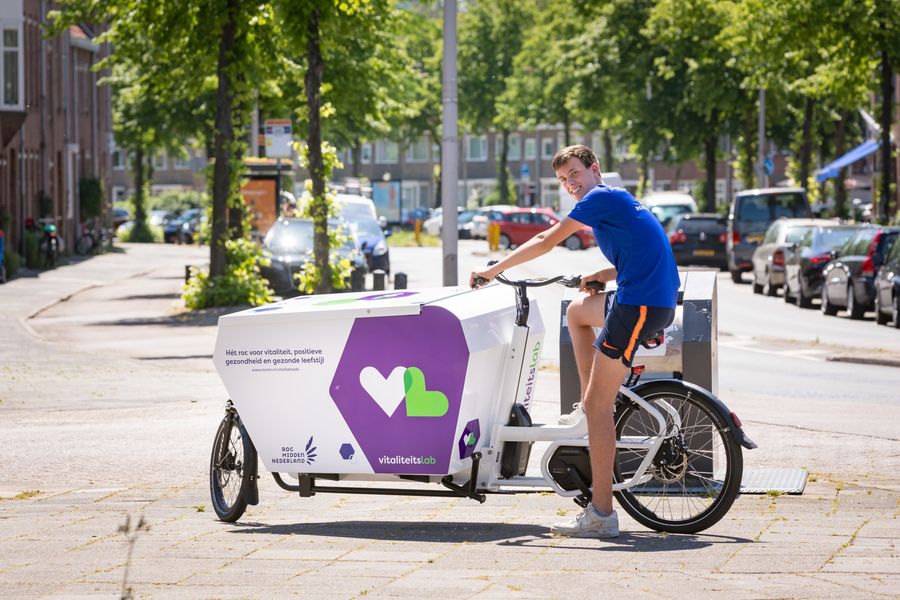
Tien startups
Innovatieve oplossingen
Vanaf 13 juni namen exposanten uit de gezondheidszorg een week lang Royal Jaarbeurs over. Maar liefst tien startups konden hun innovaties laten zien op het centrale Startup Square, waar ze duizenden potentiële klanten konden ontmoeten. Een initiatief als Dutch Health Week is een geweldige kans voor de teams die innovatieve oplossingen ontwikkelen zoals HoloMoves, Moveshelf of Vedea om er maar een paar te noemen.
Het zal geen verrassing zijn dat kunstmatige intelligentie en datagedreven toepassingen veel aandacht kregen tijdens Dutch Health Week. Van het boekingsplatform Dytter dat freelance zorgprofessionals in staat stelt om rechtstreeks contact te leggen met de instellingen en cliënten tot het Viduet platform dat zorgprofessionals helpt om hun patiënten op afstand te monitoren en te ondersteunen; technologie draait tegenwoordig om slimme oplossingen die de werkdruk helpen verlichten en tegelijkertijd betere zorg leveren.
Hoogtepunten
Interdisciplinaire symposium
Andere hoogtepunten van de Dutch Health Week waren het tweedaagse interdisciplinaire symposium in het Prinses Máxima Centrum voor kinderoncologie waar Prof. Dr. Margiet Schneider van het UMC Utrecht een gepassioneerde keynote gaf over de mogelijkheden die technologie biedt. Digitale monitoring waardoor zwangere vrouwen thuis kunnen blijven of verbeterde zorg voor premature baby's dankzij algoritmes die slaappatronen voorspellen zodat verpleegkundigen ze niet wakker hoeven te maken. Slaap is immers essentieel voor een gezonde ontwikkeling van de hersenen.
Ze hield ook een sterk pleidooi voor het in eigen hand nemen van onze gegevens, zoals de Stichting Nederlandse Datakluis. wil doen, maar dan op een speciaal nationaal gezondheidsplatform. Door data te anonimiseren en veilig op Nederlandse bodem op te slaan, nemen we de controle over welk onderzoek met welke data wordt gedaan en geven we patiënten de macht om te kiezen wat ze met welke professional delen.
“We mogen Big Tech dankbaar zijn voor alles wat het mogelijk heeft gemaakt... [maar] welke onderzoeksvragen willen we stellen? Wat is belangrijk voor de Nederlandse burger en patiënt?”
vroeg Prof. Schneider in een recent interview met Dutch Health Hub.
Conny Helder, minister voor Langdurige Zorg en Sport, wees ook op het belang van kwalitatieve data en wilde graag weten hoe we technologie beter kunnen inzetten in de ouderenzorg. Of zoals ze zei: “Er is een natuurlijke neiging om hele mooie technologische toepassingen te maken, maar vergeet de langdurige ouderenzorg niet! Zet AI en technologie in zodat ouderen langer gezond blijven.”

© Liset Verberne
Programma
Feest van innovatie
'Zakendoen in Europa' van Health Holland onderzocht de laatste trends uit Duitsland, het Verenigd Koninkrijk en Scandinavië, terwijl Jelle Drijver en Jos Hummelen van ROM Utrecht Region verschillende gezondheidsexperts aan de tand voelden tijdens hun live podcast voor ' 'Pepper'. Sessies zoals ‘Meet the Investors’ waren een populaire toevoeging aan de agenda omdat ze ondernemers in contact brachten met potentiële investeerders.
Echt, we kunnen nog wel even doorgaan met het opnoemen van alle geweldige mensen, gesprekken en innovaties die hun weg vonden naar Dutch Health Week. Het was een feest van innovatie, een verbinding van mensen en producten, een ontmoeting van harten en geesten. Of zoals Jeroen van Hooff van Royal Jaarbeurs het verwoordde: “We hebben in korte tijd veel bereikt met stakeholders. Dit is nog maar het begin. Het moet een festival worden dat 50.000 bezoekers trekt. Veel meer mensen moeten weten over 'Utrecht, hart van gezondheid'.”

